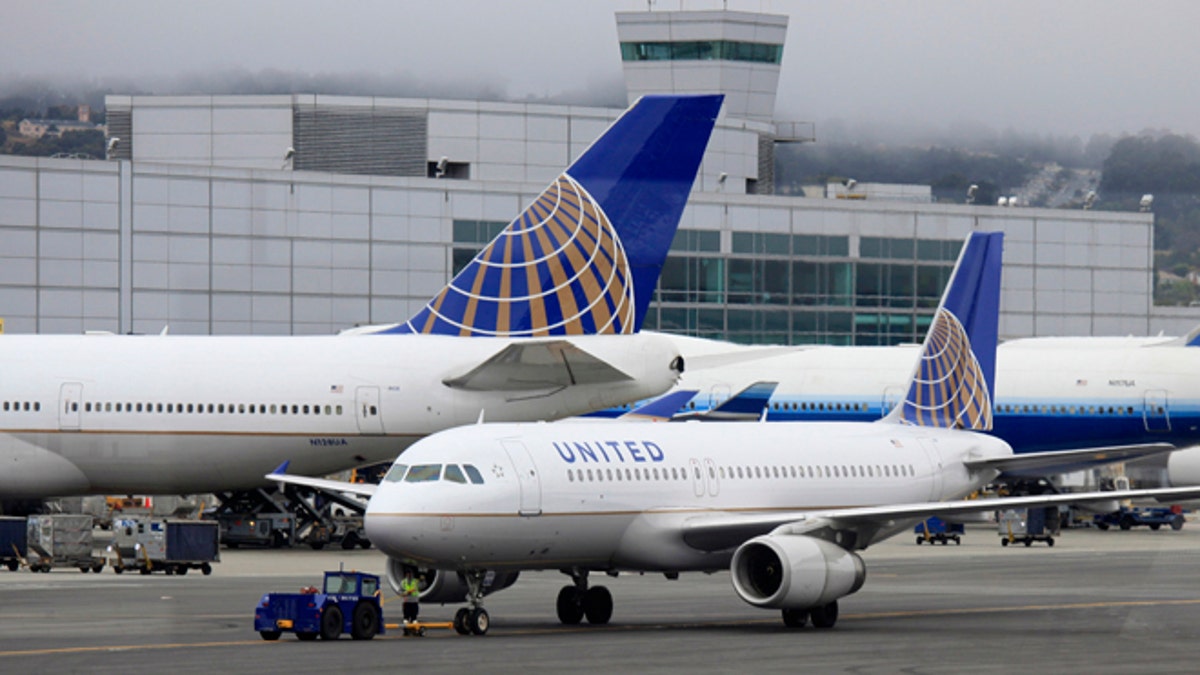
FILE - In this July 13, 2011 file photo, United Airlines planes sit on the tarmac at San Francisco International Airport in San Francisco. Thousands of United Airlines passengers around the globe were delayed for hours Thursday, Nov. 15, 2012 after another massive computer outage hit the worlds largest carrier. This is at least the third major computer outage for the Chicago-based airline since June. (AP Photo/Eric Risberg, File) (AP)
Travel industry groups are pressing members of Congress not to give in to the momentum to curb, or altogether eliminate, a visa waiver program that allows people from nearly 40 countries to visit the United States for recreation or business without a visa.
The terrorist attacks in Paris last week refocused attention on the program, which has been in place since 1986. A growing number of lawmakers are saying that given that the attackers lived in France or Belgium, and Western Europe has become a hub for terrorists who have trained in Iraq and Syria, the visa waiver program is a potential security threat.
Travel industry leaders argue that the visa waiver program already has sufficient safeguards, and that making it difficult for international visitors to come here would hurt the U.S. tourism business and economy. They’re vowing to lobby members of Congress during Thanksgiving break this week to ensure they do not support measures to restrict the program.
“We feel incredibly strongly that it would be an error for Congress to scapegoat a successful program, and put blame on the [visa waiver] for a recent tragedy,” Jonathan Grella, vice president of public affairs for the U.S. Travel Association, told FoxNews.com. “Security must come first but freedom should be valued over fear.”
Roughly 20 million people enter the United States annually through the program. Published reports say that several thousand requests are refused because they turn up on terror watch lists. Many more are rejected because the applicant appears to have stolen documents.
Sens. Jeff Flake, R-Ariz., and Dianne Feinstein, D-Calif., are working on a bill they plan to introduce that would tighten the program.
The suspected mastermind of the attacks, Abdelhamid Abaaoud, who was killed in a police raid on Wednesday, was a Belgian whose parents are Moroccan immigrants. Belgium, in fact, is said to be a hotbed of ISIS cells. Belgium's Interior Minister Jan Jambon said many of its residents had left for a period to join ISIS and get training, and said the country would "clean it" up.
Critics of the visa waiver program say that many countries that are part of it have seen an uptick in the number of “home-grown terrorists.” Many critics would like everyone coming to the United States to go through the standard visa application process, which include providing certain documentation and going through an-person interview with a U.S. official.
Sen. Richard Burr, the North Carolina Republican who chairs the Senate Select Committee on Intelligence, was quoted in the Washington Post as saying that the visa waiver program concerns him much more than the Syrian refugees looking to be resettled.
Roughly 4,000 people living in Europe have traveled to Syria to train with the Islamic States, according to national security experts.
Grella told Roll Call that his organization is “pumping out” videos and fact sheets to tout the value of the visa waiver program and counteract the negative image of it taking hold in the public.
Grella said that many who have a stake in the program, such as theme parks, hotel chains, cruise lines, casinos, and rental car providers, are contacting congressional offices both in Washington D.C. and their home districts.
“We’ve found that a very effective method of communicating,” Grella said. “We hope lawmakers will listen.”
Among the requirements for qualifying for a visa waiver program are that a nation share data on potential terrorist with the United States, that it have a visa refusal rate by the U.S. government of less than 3 percent, and that it have high standards for counterterrorism, border control and document security.
Nathan Sales, a law professor at Syracuse University who was first Deputy Assistant Secretary for Policy Development at the U.S. Department of Homeland Security, where he led efforts to tighten the visa waiver program, said that while the United States has an intricate, sophisticated system of getting airline information about travelers, the Europeans have weak links in their passenger data-gathering.
“The European border is much more porous,” Sales said to Fox News Latino, “because Europe has resisted creating the same program as the United States, mostly because of privacy concerns.”
Sales believes the visa-free agreements need to be enforced and better implemented, but he says it’s important to keep them intact because they actually can help identify security threats. For one thing, he said, the ease that it offers travelers from visa-free agreement nations also provides an incentive to their governments to share information about people suspected of terrorist or criminal activities.
Like us on Facebook




